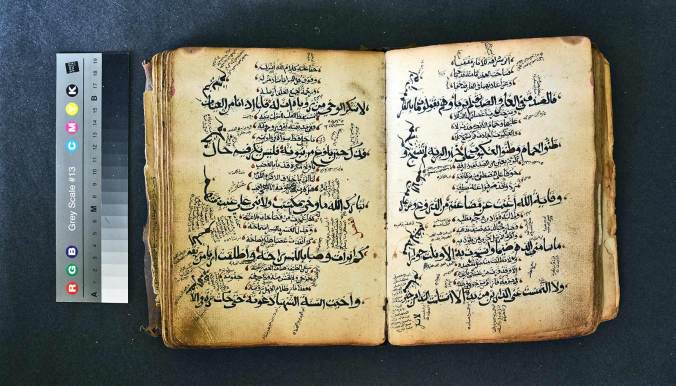
This manuscript comes from the collection “Shaykh Kamal” located in Aggaro in Western Ethiopia (Jimma zone). It is not dated but very likely from the 19th century. It contains Islamic devotional poems and hymns. This particular section of a poem in praise of the prophet Muhammad written by Shams al-Din Muhammad al-Fayyumi (14th century) on the basis of the “Poem of the Mantle,” a very renowned panegyric of the Prophet which the famous Arabic poet Muhammad al-Busiri (d. 1294) composed. The marginal notes are explanations and clarifications of some difficult passages of the text. (Credit: U. Copenhagen)
Researchers have identified and analyzed more than 2,000 Islamic manuscripts in Ethiopia, Eritrea, Djibouti, and Somalia.
Traditionally, scholars in Islamic studies have not associated the Horn of Africa with the Muslim world, which is why the Islamic literary tradition of this part of Africa has not been studied in detail before.
“SCHOLARS FROM THE FIELDS OF ISLAM STUDIES AND AFRICAN STUDIES HAVE LONG NEGLECTED THE HORN OF AFRICA…”
The researchers have digitized the manuscripts and created a database that will enable other researchers to study the fragile manuscripts and contribute to the research into this previously neglected literary tradition of Islam.
“Scholars from the fields of Islam studies and African studies have long neglected the Horn of Africa because they tend to find the area atypical of either field and primarily associate it with the Christian traditions of the Horn’s largest country Ethiopia. But as our research project has shown, there has been a rich and distinct Islamic literary tradition in the Horn of Africa that dates back at least to the 17th and 18th centuries,” explains Alessandro Gori, associate professor from the University of Copenhagen who is the principal investigator of the Islam in the Horn of Africa project.
“The manuscripts indicate that Muslims in certain parts of the Horn area seem to have had a penchant for composing devotional or mystical texts that people have gathered to recite or ‘sing’ accompanied [for example] by clapping hands and drums—although they would not have used the word ‘sing’ as it can become problematic in an Islamic context,” he adds.
“This is something that is characteristic of and particular to the Horn’s Islamic tradition, but it is still recognizably Islamic of course; you may compare it to the Lutheranism of Denmark that is different from, say, the Lutheranism of Northern Germany. But it is still Lutheranism.”